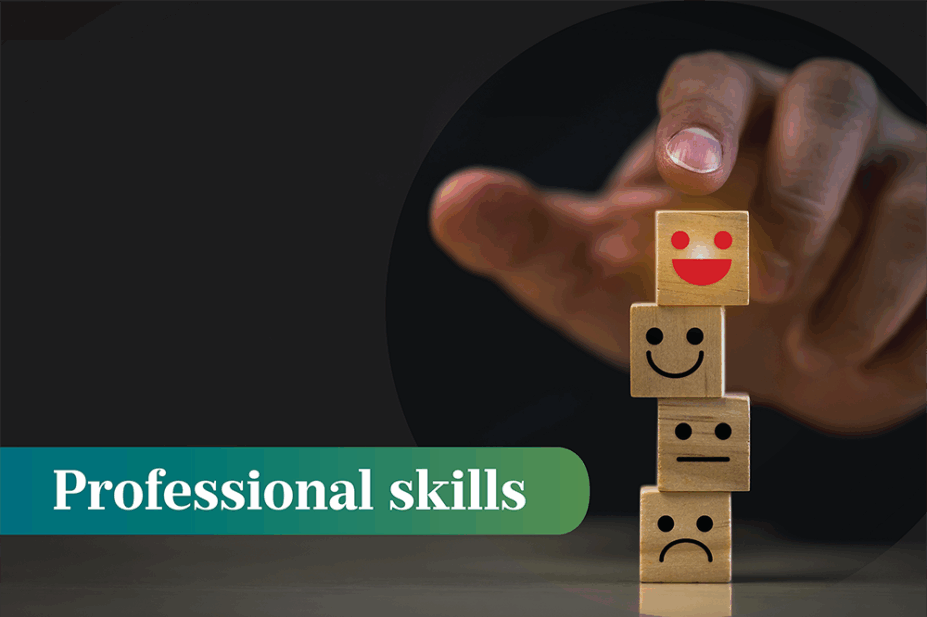
Shutterstock.com
After reading this article, you should be able to:
- Define the term emotional intelligence;
- Describe the differences between the four typologies of emotional intelligence;
- Detail the benefits of being aware of and utilising emotional intelligence in pharmacy as a manager, leader or entrepreneur.
What constitutes ‘success’ as a pharmacist – or as a manager, leader or entrepreneur? How do we know if we are being ‘effective’ in our professional lives? In our personal lives, what is the basis for knowing if we are valued by others? Human life is complicated because human beings are complex and rooted in social interactions and situations that may not always follow clear and logical protocols. The work of pharmacy managers, leaders and entrepreneurs is inherently social, interactive and brings us into interpersonal situations on a regular basis.
The term ‘emotional intelligence’ has been coined to describe the constellation of skills and attributes an individual possesses to allow them to navigate the social and interpersonal world1. While traditionally the word ‘intelligence’ has been associated with facts and logical problem-solving grounded in evidence, emotional intelligence is associated with empathy, self-assessment, reflection, intuition and communication skills2–4. The ability to accurately decipher the meaning behind the words spoken by others or to interpret nonverbal cues in social situations are both examples of how emotional intelligence influences our day-to-day lives2. The work of pharmacists brings them into frequent and routine contact with other people, sometimes in less-than-friendly or even outright hostile or challenging situations5.
Emotional intelligence is an important vehicle that human beings use to help navigate social complexity to achieve positive outcomes in ways that preserve or even build stronger relationships for the future6. As such, an understanding of emotional intelligence is crucial for success and effectiveness in both our professional and personal lives. This article aims to explore the concept of emotional intelligence typologies as a means of better understanding ourselves and others. The article has been adapted from Management, Leadership and Entrepreneurship in Pharmacy, published by Pharmaceutical Press.
What is emotional intelligence?
Emotional intelligence is most often described in terms of an individual’s ability to accurately perceive, interpret, use, understand and control/manage one’s own and other people’s emotions3,4. Those with high levels of emotional intelligence recognise the central role that emotions play in all parts of daily life, particularly in our interactions with other people7. Emotional intelligence emphasises both an individual’s capacity to recognise and self-manage their own emotional state, as well as the capacity to accurately assess and categorise other’s emotional states and work effectively through interpersonal situations3,6.
People with greater emotional intelligence demonstrate better mental health, superior job performance, enhanced career outcomes and, ultimately, greater personal and professional satisfaction and happiness8–10.
Emotional and cognitive load
We are familiar with the experience of feeling overwhelmed by our professional and personal lives. People describe this in various ways, including saying ‘I’m burnt out’, or ‘I have no bandwidth’. The experience that there is a maximum capacity in terms of what we can manage effectively is rooted in the notion of ‘load’.
Each individual has a different threshold or maximum load they can manage — beyond which additional cognitive or emotional processing becomes difficult or impossible. Cognitive emotional overload can result in poor decision-making, diminishment of empathy, lack of caring and feelings of unhappiness. Worse, over time, chronic overload can result in mental health and wellbeing issues, including an inability to actually help oneself out of the overload situation11.
Emotional intelligence has been described as a ‘life preserver’ in such situations: those with certain emotional intelligence competencies related to self-assessment and reflection are better able to self-identify overload situations, more capable of articulating their need for assistance from others and more effective at preventing overload issues from escalating to the point of danger12. Emotional intelligence can also help us to better prioritise environmental stimuli to prevent cognitive and emotional overload from occurring in the first place, allowing us to do more and be more effective and productive8,12.
Understanding personal emotional intelligence
Emotional intelligence is a crucial skill for pharmacists to develop in themselves and others. There is no universally accepted definition or model of emotional intelligence. Different theories, approaches, models and tools have been developed — some of which may work more effectively or resonate more for some people than for others.
Within the pharmacy profession, one model of emotional intelligence that has been used is built upon learning styles theory, which was first described by David Kolb13. The process of learning involves two distinct phases: first, taking in information from the outside world, then second, processing and integrating that information to demonstrate learning has occurred. The intersection of these two different processes produces four distinct ‘learning styles’.
These learning styles are typologies or idealised models of a specific kind of learner. Few, if any, of us are true and pure representations of these typologies, which serve as a useful way of describing substantive differences in the ways people interact with and learn from their environments. Within pharmacy, my colleagues and I have adapted the learning styles model within the context of emotional intelligence (i.e. Austin’s model), using the same typologies as ways of thinking about different emotional intelligences13.
Typologies
Austin’s model for emotional intelligence typologies in pharmacy uses the vocabulary and concepts first described by Kolb in learning styles theory but with specific relevance and application to pharmacy practice and pharmacists13,14. The model consists of four different kinds of emotional intelligence. Importantly, no hierarchy or preference is implied — all emotional intelligences are equally valid and valuable. The four typologies are:
- Divergers;
- Assimilators;
- Convergers;
- Accommodators.
Any of these types of emotional intelligences may be more efficient or effective in some circumstances or in achieving specific objectives.
Divergers
If a single sentence could summarise divergers, it would be: ‘Let’s just all get along, okay?’
Divergers value and draw strength from positive interpersonal interactions and tend to be their most energised and best in highly verbal, interactive, cooperative and fun environments. Occupational studies in North America suggest that around 10–15% of pharmacists are divergers13. They mainly work in areas focused on education/teaching, research or in creative areas of the profession where social interaction and autonomy are valued.
To others, divergers may appear pleasant, conversational — to the point of being too talkative — empathetic, as well as concerned about others but less concerned about accomplishments, staying on time or awards. They place a strong premium on being liked by others, rather than being right. As a result, interpersonal stress and conflict is difficult for them to manage, which they may actively avoid or, worse, simply agree to things rather than risk a fight. Divergers are generally well attuned to the emotional state of others and accurately discern non-verbal cues. However, at times, this can result in divergers trying to please and placate others.
As the label suggests, divergers often have multiple interests and fancy themselves to be ‘big picture thinkers’. At their worst, facts and specifics may bore them, while operational/logistical details may be forgotten or overlooked. Divergers place a strong premium on interpersonal harmony and fun, which tends to make them popular and well-liked. Managers and leaders who are divergers may struggle with their desire to be well-liked and their responsibilities to discipline, supervise and monitor others. They tend towards being inspirational figures who motivate others through their personality and get others to do difficult things owing to interpersonal connection.
Divergers may have difficulty disciplining or criticising others. They can also be easily overwhelmed in terms of cognitive emotional load, since divergers place such a premium on liking and being liked. Emotional reassurance and support are essential in helping them manage in such situations. Logic and reason may have limited roles in rescuing an overwhelmed diverger.
Assimilators
If a single sentence could summarise assimilators, it would be: ‘Lack of organisation on your part should be no reason for an emergency on my part.’
Assimilators value planning, details and operational issues. Occupational surveys suggest this is the most frequent emotional intelligence style for pharmacists, with approximately 60–65% of pharmacists — especially in community practice — likely being assimilators13.
Assimilators have a tendency to subdivide and compartmentalise complexity as a way of managing it more effectively. As a result, they may have the capacity to complete large amounts of work effectively and efficiently. However, this tendency to compartmentalise also extends to cognitive and emotional load, which leads many assimilators to the erroneous belief that thoughts and feelings can be segregated and independently managed. This allows them the capacity to focus on details and manage large workloads but can come at the expense of personal happiness and accurate self-appraisal.
Assimilators can seem unempathetic and detached, more interested in things rather than people. However, they get things done, are not blinded by empty promises and recognise that mastery of details and logistics is what produces successful outcomes. Assimilators need and strongly value pre-planning, organisation and efficient systems but may have difficulty thinking on their feet or dealing with unexpected situations. They do not necessarily need the limelight, attention or awards to motivate them. At times, assimilators may appear rigid and rule bound; however, they may argue they are merely being conscientious and well-organised.
Assimilators are often their own worst critics and can be unreasonably harsh judges of themselves and, sometimes, others. They can sometimes confuse ‘competence’ and ‘confidence’, mistaking other people’s glib fast-talking as evidence of superior intellect or ability. When in a cognitive-emotional-overload situation, assimilators typically respond best when they can find something in their immediate environment they can actually manage, plan and control. Rather than emphasise emotional support — as with divergers — assimilators need to feel mastery of something, no matter how small or inconsequential, to re-establish their self-confidence.
Convergers
If a single sentence could summarise convergers, it would be: ‘Relax everyone – I’m here to help!’
Of the four emotional intelligence typologies, convergers come across as the most self-confident, the most relaxed and the most competitive. Occupational surveys suggest that 10–15% of pharmacists are convergers, while 50–60% of family physicians are likely this type13.
Convergers can confuse their own confidence with competence and come across as cocky. They are not detail-oriented and prefer not to be dictated to in terms of processes. Convergers generally want to be judged on outcomes, while they are self-confident enough to take direct feedback.
Pharmacists who are convergers generally view themselves as ‘natural leaders’ and may gravitate to managerial, leadership and entrepreneurial roles. They tend to be direct communicators who have little difficulty dealing with conflict or directing the work of others. Unlike divergers, they have a stronger need to be right, rather than liked. This tendency can mean divergers pay insufficient attention to the quality of their relationships; however, convergers tend to keep their cool and make decisions in complex or difficult situations.
Convergers sometimes bristle when they are not in charge and have a tendency to believe they know what’s best for others. Learning to be more attentive to the verbal and non-verbal cues of others and taking the time to actually listen to and hear what others are saying can be difficult for convergers.
Despite their tendency to agree to do many things, convergers are less likely to experience cognitive emotional overload since they are generally confident enough to stop doing things they no longer value, reducing their load. Convergers like fast-paced environments where there is little stability or predictability. They perform well in competitive situations where there are prizes to win, people to help and an audience to impress.
Accommodators
If a sentence could summarise accommodators, it would be: ‘Are we there yet?’
Accommodators pride themselves on being ‘doers’, not ‘thinkers’ and have a strong bias towards action, rather than contemplation or reflection. Occupational surveys suggest that accommodators represent 5–10% of pharmacists but may represent closer to 40–50% of pharmacy technicians or other technological fields13.
They learn best by doing, not by reading or watching others. Accommodators may be less attentive to details — and quality outcomes — than others, believing ‘good enough is good enough’. They do not obsess about logistics or overemphasise process and quality indicators. Instead, accommodators simply like to get things done. However, they can overemphasise efficiency at the cost of interpersonal relationships.
Accommodators typically have little interest in management or leadership — perhaps even less interest in being managed or led by others. They like to have a clear and well-defined job and objectives, then be left alone to get it done. As a result, high-intensity team settings with significant interpersonal demands can sometimes be challenging for them and they may avoid them. Accommodators may be at risk of cognitive emotional burnout owing to their tendency to cope by simply doing more work, rather than actively reflecting and identifying sources of stress that are leading to overload.
Accommodators are not motivated by competition or awards and generally have a need to be right rather than liked. They may, at times, come across as less-than-conscientious rule-benders, or breakers, owing to their emphasis on efficiency. Accommodators may also come across as somewhat resistant to new ideas or changes for the sake of change, unless a clear rationale is presented and is believable.
The model of emotional intelligence presented here is just one conceptualisation of emotional intelligence. Other models of emotional intelligence have been proposed and may be just as valid and useful.
Applying emotional intelligence to pharmacy
There are several areas in the pharmacy profession that may benefit from a focused application of emotional intelligence principles.
Self-reflection
Emotional intelligence is all about self-awareness, learning better communication and building stronger, sustainable relationships. Understanding your emotional intelligence typology can help you to better understand your responses and motivations in difficult situations, rather than responding randomly and unreflectively. It can also help you find common ground with others to prevent small problems from escalating into bigger ones. Recognising that our emotional filters affect the way we interpret everyday events — and that the same events will be interpreted by different people differently — helps us to be more empathetic and open-minded in our dealings with others.
Management
Those who line manage other people need to recognise their blind spots, which are the biases, assumptions and emotional filters that prevent them from accurately and fully understanding the nuanced realities of a situation. Emotional intelligence encourages an understanding that the same words, events and situations can be interpreted by different people in different ways, depending on their biases, assumptions and emotional filters. Emotional intelligence can also provide a powerful tool for organisational development, helping members of a team better understand themselves and use a common vocabulary to discuss strengths, areas for improvement and reasons for conflict. The ‘difficult conversations’ that are part of management can be helped through mindful applications of emotional intelligence and an understanding of one’s own — and the other person’s — emotional intelligence profile.
Leadership
Leaders need to have the capacity to connect with and energise diverse audiences, which requires not just self-awareness but also insight into the needs, wants and motivations of the audience. Great leaders create an intangible but real chemistry with others — one that is rooted in the emotional intelligence principles of empathy, effective communication and the ability to accurately read, interpret and reflect verbal and non-verbal cues. The most effective leaders are those who authentically present their own emotional intelligence in a way that is compelling and inspiring, while simultaneously tuning into the emotional intelligence of others to create relationships built on trust and reciprocity. Leaders do not shy away from emotion. In fact, they recognise that emotion is as necessary as facts, evidence and logic for the complex task of leadership.
Conclusion
A pharmacist’s life is inherently social and interactional. As a result, we spend our lives trying to understand ourselves and others. Emotional intelligence is a powerful tool and model that encourages us to reflect more deeply on ourselves and accept that emotion is integral to cognition. Learning to be more attentive to our emotional selves — rather than suppressing and denying it — can help us to build better, stronger and more sustainable relationships with others, which is the core of success in professional and personal life.
- 1.Birks YF, Watt IS. Emotional intelligence and patient-centred care. J R Soc Med. 2007;100(8):368-374. doi:10.1177/014107680710000813
- 2.Romanelli F, Cain J, Smith KM. Emotional Intelligence as a Predictor of Academic and/or Professional Success. Am J Pharm Educ. 2006;70(3):69. doi:10.5688/aj700369
- 3.Sa B, Ojeh N, Majumder MAA, et al. The Relationship Between Self-Esteem, Emotional Intelligence, and Empathy Among Students From Six Health Professional Programs. Teaching and Learning in Medicine. 2019;31(5):536-543. doi:10.1080/10401334.2019.1607741
- 4.Arnone R, Cascio MI, Parenti I. The role of Emotional Intelligence in health care professionals burnout. European Journal of Public Health. 2019;29(Supplement_4). doi:10.1093/eurpub/ckz186.553
- 5.Landry L. Why emotional intelligence is important in leadership. Harvard Business Review Online Business Insights. 2019. https://online.hbs.edu/blog/post/emotional-intelligence-in-leadership
- 6.Mayer J. Leading by feel. Harvard Business Review . 2004. https://hbr.org/2004/01/leading-by-feel
- 7.Srivastava K. Emotional intelligence and organizational effectiveness. Ind Psychiatry J. 2013;22(2):97. doi:10.4103/0972-6748.132912
- 8.Rosete D, Ciarrochi J. Emotional intelligence and its relationship to workplace performance outcomes of leadership effectiveness. Leadership & Organization Development Journal. 2005;26(5):388-399. doi:10.1108/01437730510607871
- 9.Melita Prati L, Douglas C, Ferris GR, Ammeter AP, Buckley MR. EMOTIONAL INTELLIGENCE, LEADERSHIP EFFECTIVENESS, AND TEAM OUTCOMES. The International Journal of Organizational Analysis. 2003;11(1):21-40. doi:10.1108/eb028961
- 10.Carmeli A. The relationship between emotional intelligence and work attitudes, behavior and outcomes. Journal of Managerial Psychology. 2003;18(8):788-813. doi:10.1108/02683940310511881
- 11.Van Heer S, Cofie N, Gutiérrez G, Upagupta C, Szulewski A, Chaplin T. Shaken and stirred: emotional state, cognitive load, and performance of junior residents in simulated resuscitation. Can Med Ed J. Published online August 18, 2021. doi:10.36834/cmej.71760
- 12.Drigas AS, Papoutsi C. A New Layered Model on Emotional Intelligence. Behavioral Sciences. 2018;8(5):45. doi:10.3390/bs8050045
- 13.Austin Z. Learning styles of pharmacists: impact on career decisions, practice patterns and teaching method preferences. Pharmacy Education . 2004. https://pharmacyeducation.fip.org/pharmacyeducation/article/view/59
- 14.House RJ, Aditya RN. The Social Scientific Study of Leadership: Quo Vadis? Journal of Management. 1997;23(3):409-473. doi:10.1177/014920639702300306


